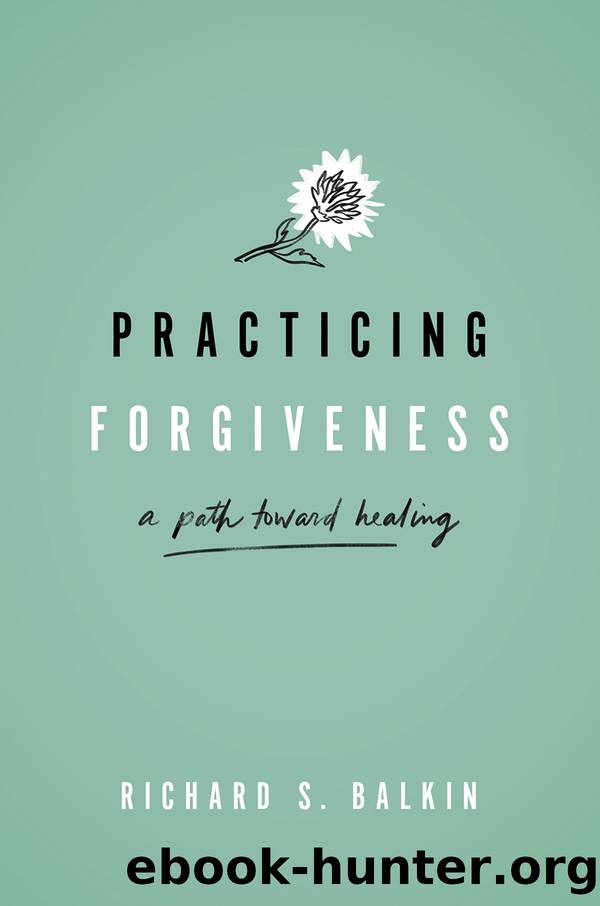Practicing Forgiveness by Richard S. Balkin

Author:Richard S. Balkin
Language: eng
Format: epub
Publisher: Oxford University Press
Published: 2020-11-15T00:00:00+00:00
While some of these themes refer to the lack of resources or assistance (e.g., âI had nowhere to goâ) or the fear of retaliation (e.g., âI was too afraid of what he/she might do if I leftâ), other statements were indicative of the previously identified defense mechanisms, such as introjection (e.g., âI would have been a failure if I left the relationship;â âI did not want to be perceived as weakâ); rationalization (e.g., âIt was not his/her fault that he/she hurt meâ); or reaction formation (e.g., âI had to stay to save him/herâ). In the latter example, the impulse may be to leave an abusive relationship, but the decision to stay is based on the false presumption that the person can be âfixedâ in some way and the victim then becomes the hero. Within these themes, we also see what is known as cognitive distortionsâunhealthy beliefs such as self-blame or guilt (e.g., âI thought that the abuse was my faultâ). Individuals who continue to feel responsible for the abuse they incurred may be at risk for putting themselves back in dangerous situations.19
An individual who has suffered harm from another may try to find ways to stay in the relationship. Leaving a relationship, even a bad one, can be a source of grief. Being hurt in a relationship can be traumatic, but being alone, especially when dependency was part of the relationship, may be extremely difficult. Recall Deanna who stayed in an abusive relationship with her ex-boyfriend, became addicted to crystal methamphetamine, and was raped repeatedly. Leaving the relationship seems like a simple decision, but aside from emotional or financial dependency, Deanna might feel like she can save her ex-boyfriend, believe that she is to blame for the abuse and failure in the relationship, fear being alone, or minimize the abuse incurred. Moreover, the offender might be reinforcing these beliefs because this is another way an abuser exerts control over the victim.
Premature reconciliation can cause blindness. Just kidding. But processing beliefs about reconciliation and the extent to which reconciliation is beneficial is important to addressing the questions, concerns, and potential resentment toward the offender. Obviously, a relationship that has been breached and in which the victim initiates a reconciliation process too soon can result in premature reconciliationâinternal resentment from the victim toward the offender when forgiveness and reconciliation are pursued too soonâand may increase the likelihood of a permanently severed relationship.
Is this going to happen again? If a victim is living in fear or trepidation that the offender will commit another transgression, whether it is infidelity, emotional abuse, or neglectful behavior, then addressing that distrust is essential to reconciling a relationship. Of course, an offender who wants the reconciliation will often push back with, âHow can I earn your trust if you do not give me the chance?â These tend to be circular arguments: âI do not trust you, and therefore it is too soonâ versus âYou will never trust me if you do not give me a chance.â The risk in reconciliation is taken by the victim.
Download
This site does not store any files on its server. We only index and link to content provided by other sites. Please contact the content providers to delete copyright contents if any and email us, we'll remove relevant links or contents immediately.
The Concise Laws of Human Nature by Robert Greene(1913)
Bioenergetica by Alexander Lowen(1475)
After by Bruce Greyson(1419)
The Child in You by Stefanie Stahl(1266)
No Bad Parts by Richard C. Schwartz(1250)
Stress-Proof Your Brain The Yogic Way: Unique Ancient Indian Techniques to End Toxic Stress, Stop Worrying and Inculcate Mental Toughness by Advait(1132)
The Power of Myth by Joseph Campbell & Bill Moyers(1065)
Talk of the Ton by unknow(1059)
Badass Habits: Cultivate the Awareness, Boundaries, and Daily Upgrades You Need to Make Them Stick by Jen Sincero(1043)
Chakras & Self-Care by Ambi Kavanagh(963)
Living a Life of Awareness by Don Miguel Ruiz Jr(938)
Learn To Think Using Thought Experiments by King Patrick(912)
Self-Care for Empaths by Tanya Carroll Richardson(912)
The Mind by E. Bruce Goldstein(902)
The 7 Secrets of Sound Healing Revised Edition by Jonathan Goldman(891)
Curative Magic by Rachel Patterson(883)
The Quantum Psychiatrist: From Zero to Zen Using Evidence-Based Solutions Beyond Medication and Therapy by Biswas Dona(881)
The Tao of Intimacy and Ecstasy by Solala Towler(875)
The Anxiety First Aid Kit by Rick Hanson(849)
